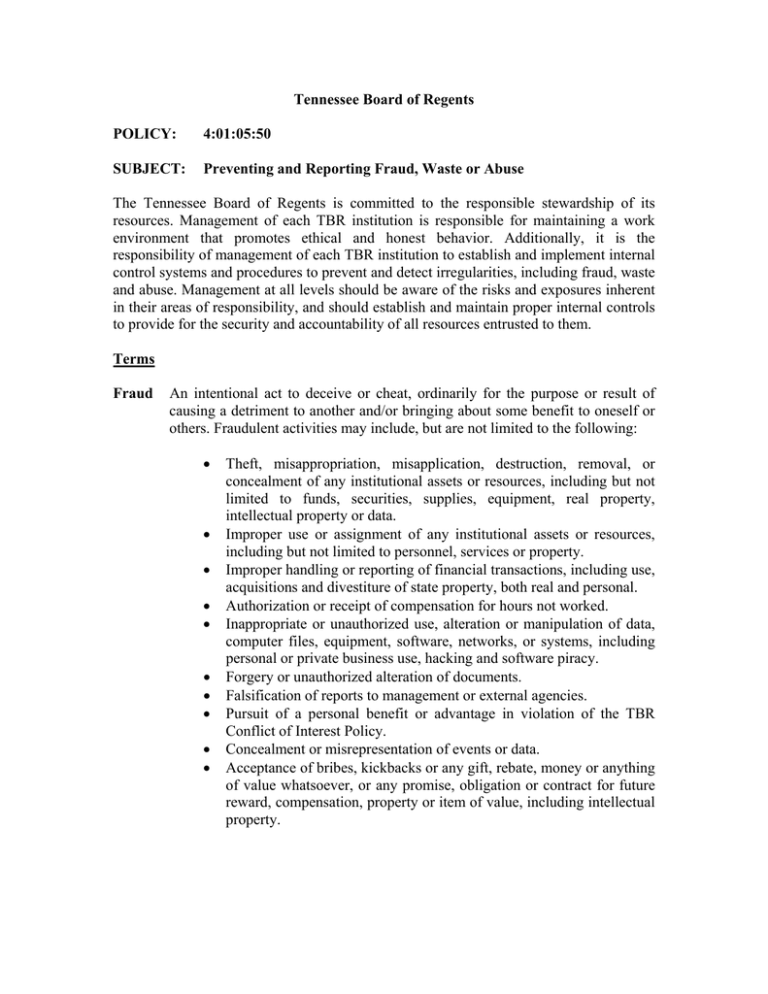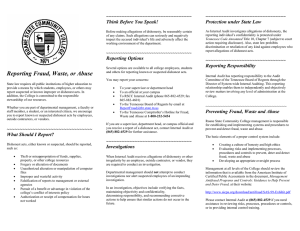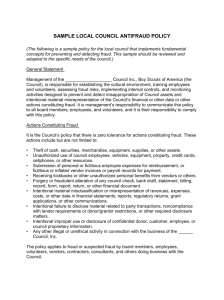Tennessee Board of Regents SUBJECT: Preventing and Reporting Fraud, Waste or Abuse
advertisement

Tennessee Board of Regents POLICY: 4:01:05:50 SUBJECT: Preventing and Reporting Fraud, Waste or Abuse The Tennessee Board of Regents is committed to the responsible stewardship of its resources. Management of each TBR institution is responsible for maintaining a work environment that promotes ethical and honest behavior. Additionally, it is the responsibility of management of each TBR institution to establish and implement internal control systems and procedures to prevent and detect irregularities, including fraud, waste and abuse. Management at all levels should be aware of the risks and exposures inherent in their areas of responsibility, and should establish and maintain proper internal controls to provide for the security and accountability of all resources entrusted to them. Terms Fraud An intentional act to deceive or cheat, ordinarily for the purpose or result of causing a detriment to another and/or bringing about some benefit to oneself or others. Fraudulent activities may include, but are not limited to the following: • • • • • • • • • • Theft, misappropriation, misapplication, destruction, removal, or concealment of any institutional assets or resources, including but not limited to funds, securities, supplies, equipment, real property, intellectual property or data. Improper use or assignment of any institutional assets or resources, including but not limited to personnel, services or property. Improper handling or reporting of financial transactions, including use, acquisitions and divestiture of state property, both real and personal. Authorization or receipt of compensation for hours not worked. Inappropriate or unauthorized use, alteration or manipulation of data, computer files, equipment, software, networks, or systems, including personal or private business use, hacking and software piracy. Forgery or unauthorized alteration of documents. Falsification of reports to management or external agencies. Pursuit of a personal benefit or advantage in violation of the TBR Conflict of Interest Policy. Concealment or misrepresentation of events or data. Acceptance of bribes, kickbacks or any gift, rebate, money or anything of value whatsoever, or any promise, obligation or contract for future reward, compensation, property or item of value, including intellectual property. Waste Waste involves behavior that is deficient or improper when compared with behavior that a prudent person would consider reasonable and necessary business practice given the facts and circumstances. Waste is a thoughtless or careless act, resulting in the expenditure, consumption, mismanagement, use, or squandering of institutional assets or resources to the detriment or potential detriment of the institution. Waste may also result from incurring unnecessary expenses due to inefficient or ineffective practices, systems, or controls. Waste does not necessarily involve fraud, violation of laws, regulations, or provisions of a contract or grant agreement. Abuse Abuse involves behavior that is deficient or improper when compared with behavior that a prudent person would consider reasonable and necessary business practice given the facts and circumstances. Abuse also includes misuse of authority or position for personal financial interest or those of an immediate or close family member or business associate. Abuse does not necessarily involve fraud, violation of laws, regulations, or provisions of a contract or grant agreement. (U.S. Government Accountability Office, Government Auditing Standards, July 2007.) Preventing Fraud, Waste or Abuse Maintaining an Ethical Work Environment – Management is responsible for maintaining a work environment that promotes ethical and honest behavior on the part of all employees, students, contractors, vendors and others. To do so, management at all levels must behave ethically and communicate to employees and others that they are expected to behave ethically. Management must demonstrate through words and actions that unethical behavior will not be tolerated. Implementing Effective Internal Control Systems – Management of each TBR institution has the responsibility to establish and implement internal control systems and procedures to prevent and detect irregularities, including fraud, waste and abuse. Internal controls are processes performed by management and employees to provide reasonable assurance of: • • • • safeguards over institutional assets and resources, including but not limited to cash, securities, supplies, equipment, property, records, data or electronic systems; effective and efficient operations; reliable financial and other types of reports; and compliance with laws, regulations, contracts, grants and policies. To determine whether internal controls are effective, management should perform periodic risk and control assessments, which should include the following activities: 1. Review the operational processes of the unit under consideration. 2. Determine the potential risk of fraud, waste, or abuse inherent in each process. 3. Identify the controls included in the process (or controls that could be included) that result in a reduction in the inherent risk. 4. Assess whether there are internal controls that need to be improved or added to the process under consideration. 5. Implement controls or improve existing controls that are determined to be the most efficient and effective for decreasing the risk of fraud, waste or abuse. Most managers will find that processes already include a number of internal controls, but these controls should be monitored or reviewed for adequacy and effectiveness on a regular basis and improved as needed. Typical examples of internal controls may include, but are not limited to: • • • • • • Adequate separation of duties among employees. Sufficient physical safeguards over cash, supplies, equipment and other resources. Appropriate documentation of transactions. Independent validation of transactions for accuracy and completeness. Documented supervisory review and approval of transactions or other activities. Proper supervision of employees, processes, projects or other operational functions. Reviews of Internal Control Systems – Audits or other independent reviews may be performed on various components of the internal control systems. Internal Audit – Internal Audit is responsible for assessing the adequacy and effectiveness of internal controls that are implemented by management and will often recommend control improvements as a result of this assessment. During an audit of a department or process, Internal Audit will also perform tests designed to detect fraud, waste or abuse that may have occurred. External Audits – The Tennessee Department of Audit, Division of State Audit, performs periodic financial audits of Tennessee Board of Regents universities and community colleges. One purpose of this type audit is to evaluate an institution’s internal controls, which will often result in recommendations for control improvements. State Audit will also perform tests designed to detect fraud, waste or abuse that may have occurred. Other Reviews – Various programs may be subject to audits or reviews by federal, state or other outside agencies based on the type of program, function or funding. Although audits and reviews may include assessments of internal controls, the primary responsibility for prevention and detection of fraud, waste or abuse belongs to management. Therefore, management should take steps to review internal controls whether or not audits are to be performed. Reporting Fraud, Waste or Abuse Responsibility for Reporting Fraud, Waste or Abuse – Institutional management, faculty and staff with a reasonable basis for believing that fraud, waste or abuse has occurred must immediately report such incidents. Students, citizens and others are strongly encouraged to report known or suspected acts of fraud, waste or abuse. Although proof of an improper activity is not required at the time the incident is reported, anyone reporting such actions must have reasonable grounds for doing so. Employees with knowledge of matters constituting fraud, waste or abuse, that fail to report it or employees who knowingly make false accusations may be subject to disciplinary action. Protection from Retaliation - State law prohibits discrimination or retaliation against employees for reporting allegations of dishonest acts or cooperating with auditors conducting an investigation. The Higher Education Accountability Act of 2004 directs that a person who knowingly and willingly retaliates or takes adverse action of any kind against any person for reporting alleged wrongdoing pursuant to the provisions of this part commits a Class A misdemeanor. Confidentiality of Reported Information – According to the Higher Education Accountability Act of 2004, detailed information received pursuant to a report of illegal, improper, wasteful or fraudulent activity or any on-going investigation thereof shall be considered working papers of the internal auditor and shall be confidential. Such information may be disclosed, however, upon an order of a court or subpoena. Methods for Reporting Fraud, Waste or Abuse – Several options are available to employees, students and others for reporting acknowledged or suspected dishonest acts. Incidents should be reported to: • • • • • a supervisor or department head; an institutional official; the institutional internal auditor; the Office of System-wide Internal Audit at 615-366-4441 or reportfraud@tbr.edu; or the Tennessee Comptroller of the Treasury’s Hotline for fraud, waste and abuse at 1-800-232-5454. Any employee who becomes aware of known or suspected fraud, waste or abuse must immediately report the incident to an appropriate departmental official. If the incident involves their immediate supervisor, the employee must report the incident to the next highest-level supervisor. Employees should not confront the suspected individual or initiate an investigation on their own since such actions could compromise the investigation. A department official or other supervisor who receives notice of known or suspected fraud, waste or abuse must immediately report the incident to the following: 1. President/Vice President for Business and Finance/TTC Director (or designee) 2. Internal Audit Department 3. Safety and Security Office/Campus Police (when appropriate) The President/Vice President/Director or designee will immediately notify the TBR Vice Chancellor for Business and Finance and the Director of System-wide Internal Audit regarding the acknowledged or suspected fraud or misconduct. TTC Directors should also report such matters to the Vice Chancellor for Tennessee Technology Centers and the Lead Institution Vice President for Business and Finance. The Director of System-wide Internal Audit will notify the Comptroller of the Treasury of instances of fraudulent activity or other misconduct. After initial notification, each institution should refer to TBR Guideline B-080, Reporting and Resolution of Institutional Losses, for additional reporting procedures. Investigations/Actions Cooperation of Employees – Individuals involved with suspected fraudulent activity or misconduct must assist with and cooperate in any authorized investigation, including providing complete, factual responses to questions and either providing access to or turning over relevant documentation immediately upon request by any authorized person. Any person refusing to provide such assistance must be notified that such refusal may result in the imposition of discipline, up to and including termination. Failure to provide such notice will not preclude the institution from terminating the employee. Remedies Available – The Tennessee Board of Regents will evaluate the information provided and make a determination concerning external reporting obligations, if any, and the feasibility of pursuing available legal remedies against persons or entities involved in misconduct or fraudulent acts against the institution. Remedies include, but are not limited to, terminating employment, requiring restitution, and forwarding information regarding the suspected fraud to appropriate external authorities for criminal prosecution. In those cases where disciplinary action is warranted, the Office of Personnel/Human Resources, Office of General Counsel, and other appropriate offices shall be consulted prior to taking such action, and applicable institutional and Board policies related to imposition of employee discipline shall be observed. Resignation of Suspected Employee – An employee suspected of misconduct may not resign as an alternative to discharge after the investigation has been completed. Exceptions to this requirement can only be made by the institution’s President/Director, and require advance consultation with and approval by the Vice Chancellor for Business and Finance. If the employee resigns during the investigation, the employment records must reflect the situation as of the date of the resignation and the outcome of the investigation (General Personnel Policy, 5:01:00:00). Effect on Annual Leave – An employee who is dismissed for gross misconduct or who resigns or retires to avoid dismissal for gross misconduct shall not be entitled to any payment for accrued but unused annual leave at the time of dismissal (Annual Leave Policy, 5:01:01:01). Student Involvement – Students found to have participated in misconduct or fraudulent acts as defined by this guideline will be subject to disciplinary action pursuant to the TBR Policy 3:02:00:01, General Regulations on Student Conduct and Disciplinary Sanctions. The Dean of Students/Vice President of Student Affairs/TTC Director (or designee) will be responsible for adhering to applicable due process procedures and administering appropriate disciplinary action. Confidentiality During Investigation – All investigations will be conducted in as strict confidence as possible, with information sharing limited to persons on a “need to know” basis. The identities of persons communicating information or otherwise involved in an investigation or allegation of misconduct or fraudulent activity will not be revealed beyond the institution and staff of the TBR Offices of General Counsel, Business and Finance and System-wide Internal Audit unless necessary to comply with reporting requirements, state law or if legal action is taken. Management’s Follow-up Responsibility – Administrators at all levels of management must implement, maintain, and evaluate an effective compliance program to prevent and detect fraudulent activities. Once fraud has been reported, the overall resolution should include an assessment of how it occurred, an evaluation of what could prevent recurrences of the same or similar conduct, and implementation of appropriate controls, if needed. Source: TBR Meeting, March 28, 2008.



